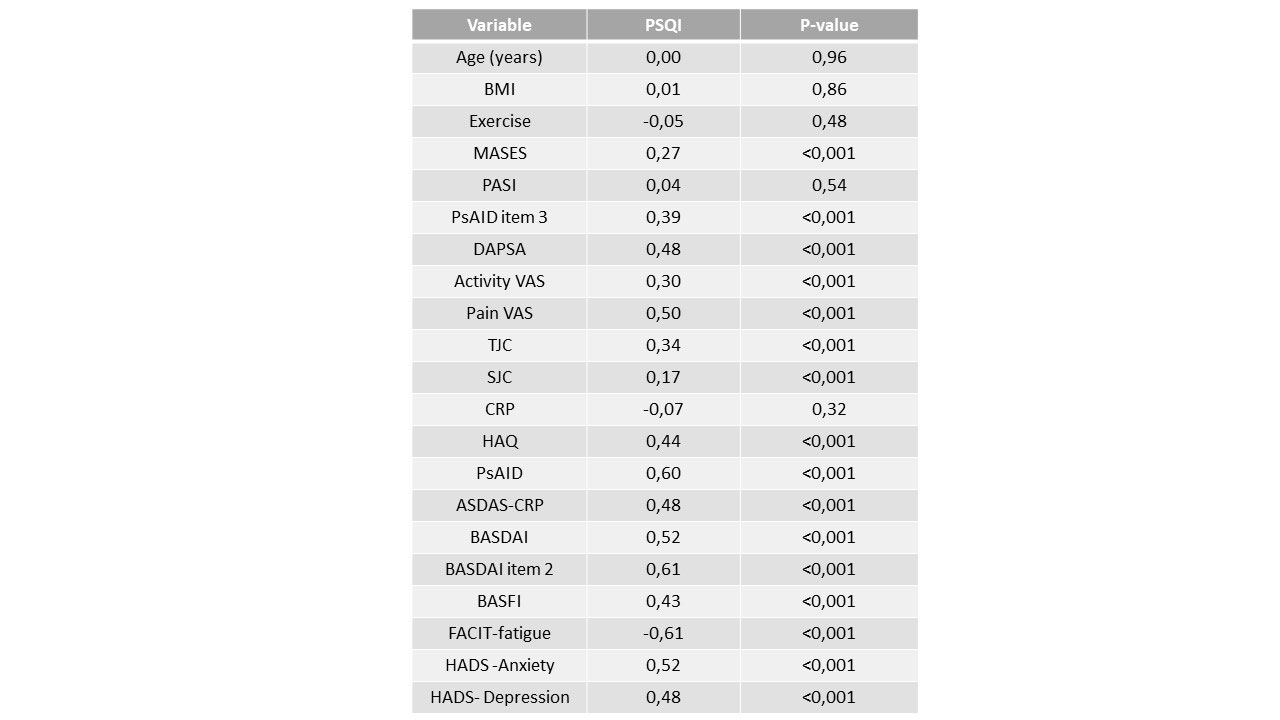Session Information
Date: Saturday, November 12, 2022
Title: Spondyloarthritis Including PsA – Diagnosis, Manifestations, and Outcomes Poster I
Session Type: Poster Session A
Session Time: 1:00PM-3:00PM
Background/Purpose: To evaluate the quality of sleep in patients with psoriatic arthritis (PsA) and its relationship with/to clinical variables, activity, functionality, the impact of the disease, and emotional factors.
Methods: It is a cross-sectional study involving 247 patients diagnosed with psoriatic arthritis. Sleep quality was measured using the PSQI questionnaire. Bivariate correlations were performed between PSQI, gender, number of affected entheses, PASI, peripheral activity (cDAPSA), axial activity (ASDAS-CRP and BASDAI), functionality (BASFI and HAQ), disease impact (PsAID), anxiety, depression (HADS) and fatigue (FACITfatigue). Significant cDAPSA variables, FACIT-F, HADS-A and HADS-D were included in a multiple linear regression model. On the other hand, the PSQI variable was categorized according to the cut-off point PSQI < 6 (good sleep quality) or PSQI ≥ 6 (poor sleep quality).Univariate analysis was performed with baseline variables, disease activity, and the different PROS included between the two groups of patients. Stepwise logistic regression, adjusted for female gender and presence of fibromyalgia, included the significant components of cDAPSA, FACIT-F, HADS-A, and HADS-D as independent variables and PSQI categorization as dependent variable.
Results: 63.15% had poor sleep quality. Of these patients, 46.5% were not taking treatment for insomnia. Female patients with a higher number of affected entheses, higher peripheral and axial activity, fatigue, anxiety, or depression had worse sleep quality. The PSQI was also related to the functionality and impact of the disease. The results are shown in the table. Multiple linear regression modelling revealed that pain [b: 0.48, p< 0.001] and fatigue [b:-0.13, p< 0.001, 95%CI] contributed 43% to the sleep quality pattern. In logistic regression, pain (OR: 1.20 [1.01-1.43)], fatigue [OR: 0.89 (0.84, 0.95)] and anxiety [OR: 1.27 (1.06-1.51)] accounted for 48% of poor sleep quality (PSQI ≥ 6).
Conclusion: Poor sleep quality was frequent in patients with PsA, despite which almost half did not perform any treatment. Emotional factors (fatigue, anxiety) were more relevant than inflammatory factors on sleep quality. The circular relationship between sleep quality, emotional disorders, and activity makes a multidisciplinary approach to the disease necessary.
To cite this abstract in AMA style:
Ibañez Martinez M, Pastor Navarro S, Compán Fernández O, Miguel Ibáñez B, Turrión Nieves A, Gómez Castro S, Martínez González O, Hidalgo Calleja C, Toledano Martinez E, Montilla Morales C. Sleep Quality in Patients with Psoriatic Arthritis and Its Relationship with Activity and Comorbidity [abstract]. Arthritis Rheumatol. 2022; 74 (suppl 9). https://acrabstracts.org/abstract/sleep-quality-in-patients-with-psoriatic-arthritis-and-its-relationship-with-activity-and-comorbidity/. Accessed .« Back to ACR Convergence 2022
ACR Meeting Abstracts - https://acrabstracts.org/abstract/sleep-quality-in-patients-with-psoriatic-arthritis-and-its-relationship-with-activity-and-comorbidity/

